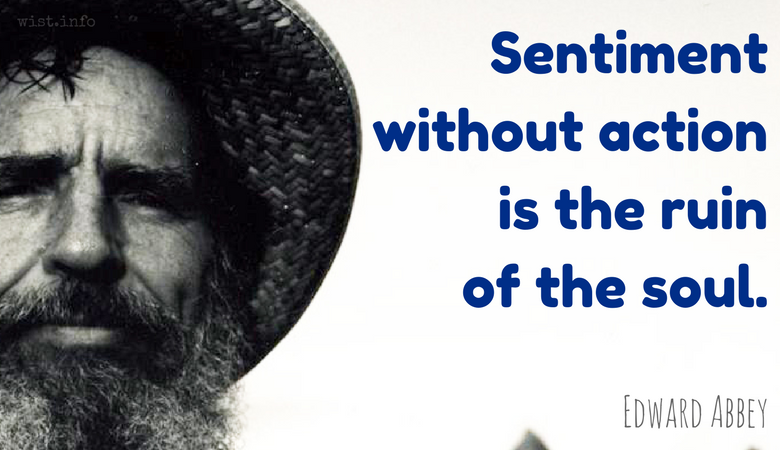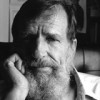There are dangers in sentimentalizing nature. Most sentimental ideas imply, at bottom, a deep if unacknowledged disrespect. It is no accident that we Americans, probably the world’s champion sentimentalizers about nature, are at one and the same time probably the world’s most voracious and disrespectful destroyers of wild and rural countryside.
Jane Jacobs (1916-2006) American-Canadian journalist, author, urban theorist, activist
The Death and Life of Great American Cities, Part 4, ch. 22 (1961)
(Source)
Quotations about:
sentiment
Note not all quotations have been tagged, so Search may find additional quotes on this topic.
Thoughts are the shadows of our feelings — always darker, emptier, and simpler.
[Gedanken sind die Schatten unserer Empfindungen, — immer dunkler, leerer, einfacher, als diese.]
Friedrich Nietzsche (1844-1900) German philosopher and poet
The Gay Science [Die fröhliche Wissenschaft], Book 3, § 179 (1882) [tr. Kaufmann (1974)]
(Source)
Also known as La Gaya Scienza, The Joyful Wisdom, or The Joyous Science.
(Source (German)). Alternate translations:Thoughts are the shadows of our sentiments -- always, however, obscurer, emptier, and simpler.
[tr. Common (1911)]Thoughts are the shadows of our sensations -- always darker, emptier, simpler.
[tr. Nauckhoff (2001)]Thoughts are shadows of our feelings -- always darker, emptier and simpler than these.
[tr. Hill (2018)]
In this and like communities, public sentiment is everything. With public sentiment, nothing can fail; without it nothing can succeed. Consequently, he who molds public sentiment goes deeper than he who enacts statutes or pronounces decisions. He makes statues and decisions possible or impossible to be executed.
Abraham Lincoln (1809-1865) American lawyer, politician, US President (1861-65)
Lincoln-Douglas Debates, Debate #1, Ottawa, Illinois (21 Aug 1858)
(Source)
Sentiment without action is the ruin of the soul.
Edward Abbey (1927-1989) American anarchist, writer, environmentalist
A Voice Crying in the Wilderness, ch. 4, “Life and Death and All That” (1989)
(Source)
Sometimes incorrectly quoted as "Belief without action is the ruin of the soul."
There is nothing which spreads more contagiously from teacher to pupil than elevation of sentiment: Often and often have students caught from the living influence of a professor a contempt for mean and selfish objects, and a noble ambition to leave the world better than the found it; which they have carried with them throughout life.
John Stuart Mill (1806-1873) English philosopher and economist
“On Education,” speech, University of St Andrews (1 Feb 1867)
(Source)
It is when the sentimentalist turns preacher of morals that we investigate his character, and are justified in so doing. He may express as many and as delicate shades of feeling as he likes, — for this the sensibility of his organization perfectly fits him, no other person could do it so well, — but the moment he undertakes to establish his feeling as a rule of conduct, we ask at once how far are his own life and deed in accordance with what he preaches? For every man feels instinctively that all the beautiful sentiments in the world weigh less than a single lovely action; and that while tenderness of feeling and susceptibility to generous emotions are accidents of temperament, goodness is an achievement of the will and a quality of the life. Fine words, says our homely old proverb, butter no parsnips; and if the question be how to render those vegetables palatable, an ounce of butter would be worth more than all the orations of Cicero. The only conclusive evidence of a man’s sincerity is that he give himself for a principle. Words, money, all things else, are comparatively easy to give away; but when a man makes a gift of his daily life and practice, it is plain that the truth, whatever it may be, has taken possession of him.
James Russell Lowell (1819-1891) American diplomat, essayist, poet
“Rousseau And The Sentimentalists,” North American Review (Jul 1867)
(Source)
How can cosmic religious feeling be communicated from one person to another, if it can give rise to no definite notion of a God and no theology? In my view, it is the most important function of art and science to awaken this feeling and keep it alive in those who are receptive to it.
Albert Einstein (1879-1955) German-American physicist
“Religion and Science,” New York Times Magazine (9 Nov 1930)
(Source)
Charity is a virtue of the heart, and not of the hands, says an old writer. Gifts and alms are the expressions, not the essence of this virtue. A man may bestow great sums on the poor and indigent without being charitable, and may be charitable when he is not able to bestow anything. Charity is therefore a habit of good will, or benevolence in the soul, which disposes us to the love, assistance, and relief of mankind, especially of those who stand in need of it.
Joseph Addison (1672-1719) English essayist, poet, statesman
Essay (1713-09-21), The Guardian, No. 166
(Source)
The holiest of holidays are those
Kept by ourselves in silence and apart;
The secret anniversaries of the heart,
When the full river of feeling overflows.










